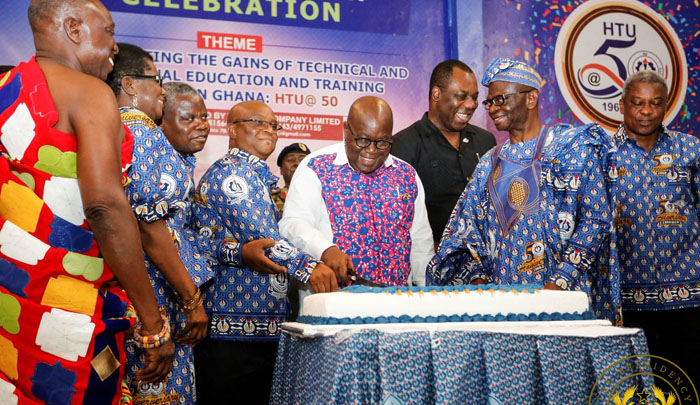President Akufo-Addo cuts 50th anniversary cake
The Ho Technical University (HTU), which was formerly known as Ho Polytechnic, will soon be named Ephraim Amu Technical University provided all necessary parliamentary processes are completed, President Akufo-Addo has announced.
According to the president, the decision for the name change was made by the Governing Council of HTU in accordance with the statutes of the university who believed it was great to rename the institution after Ephraim Amu, the great Ghanaian cultural icon.
The president who described the decision as “an excellent one,” said “it had received the blessings of the President of the Republic so that once the parliamentary process has been completed, HTU will thereafter be called the Ephraim Amu Technical University, Ho”.
President Akufo-Addo disclosed this in Ho during the grand durbar of the 50th anniversary celebration of HTU over the weekend. The event which attracted current and former ministers of state, members of parliament, municipal and district chief executives, the academia, traditional leaders, alumni, among others, was under theme, “Consolidating the Gains of Technical and Vocational Education and Training (TVET) in Ghana: HTU @ 50.”
The president was happy that the renowned musicologist who hails from Peki in the South Dayi District of the Volta Region and “composer of what easily passes for our unofficial national anthem, ‘Yen Ara Asase Ne,’ should be properly honoured by a grateful posterity and especially by citizens of his native Volta Region”.
TVET to Transform Ghana
President Nana Addo Dankwa Akufo-Addo who has time without number expressed his commitment towards industrialising the country under his ‘Ghana Beyond Aid’ agenda stressed that the vision would be impossible without prioritising Technical and Vocational Education.
According to him, the countries which gained independence 61 years ago such as Malaysia, Singapore and South Korea have outstripped Ghana in terms of development because they made the fundamental decision to transform their economies from raw material, low productivity, agrarian economies, to value-added industrial economies.
To this end, if Ghana can be developed, create jobs, become an economic giant and compete internationally in a favourable manner, the same transformation must be engineered by relying substantially on technical and vocational education, skills training and technology.
It is for this reason that government has placed importance on giving access to a minimum of senior high education under the Free SHS programme as well as expansion of TVET at both secondary and tertiary levels with strong linkages with industry.
This is being made possible by placing all public TVET institutions in the country under the supervision of the Ministry of Education with a Deputy Minister, Barbara Asher Ayisi, responsible for it. This replaces the formal uncoordinated system where over 19 different ministries, departments and agencies handled the various forms of TVET education.
Projects
President Akufo-Addo admitted that government was aware of the infrastructural challenges of technical universities including the HTU. He said staff flat, vice-chancellors’ residence, and other projects started nine years ago under President Kufuor and abandoned by the erstwhile NDC government.
Prof. Emmanuel James Flolu, Chairman of Governing Council and the Interim Vice-Chancellor of HTU, Prof. Emmanuel Kojo Sakyi, narrated the journey of the university while the Education Minister, Matthew Opoku Prempeh and the Volta Regional Minister, Dr. Archibald Letsa, called on all and sundry to keep supporting HTU to become a world-class university, producing great leaders.
The HTU was established in 1968 as a Technical Institute with the objective of providing pre-technical education. It became a Polytechnic in 1986 and got upgraded to a fully-fledged tertiary institution in 1993 by the enactment of PNDC Law 321 and was finally converted to a Technical University by Technical Universities Act 2016.
The university is organised into faculties, schools, departments, centres, and units and currently runs Bachelor of Technology programmes, HND, Technician Certificates and runs a joint Master of Technology programmes.
From Fred Duodu, Ho (k.duodu@yahoo.com)


